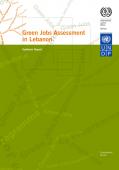This paper evaluates the emerging green economy in South Africa, using ideas from the concept of sustainable rural livelihoods, which are intimately connected to ecological services many developing countries. It finds that African communities and governments are prioritising green economy for job creation, poverty alleviation and reducing inequalities, while addressing global environmental concerns. What remains problematic, however, is how these objectives are to be achieved. The paper argues that one of the key challenges in South Africa is the gap between policy and implementation of sustainable development, the Millennium Development Goals and other globally driven initiatives. The paper emphasises that green economy policy needs to consider poverty reduction and women’s empowerment in order to promote rural sustainable development.
This summary was prepared by Eldis.
The purpose of this document is to provide guidance to UN Country teams on how to integrate Green Jobs at country level, including joint programmes and the Development Assistance Framework(UNDAF) process.
The Green Jobs Programme of the International Labour Organization (ILO) works towards environmentally sustainable economic and social development. Green jobs allow the generation of alternative employment with reduced environmental impact. The report presents the programme's activities of the past biennium and shows how these activities lead towards the programme's objective.

The study comprises four assessments in the sectors energy, building and construction, agriculture and waste management. Provided is a general overview of the sectors, the related policies and legislations and the available and planned financing and investments. Furthermore, the assessments allowed estimating the number of potential green jobs that can be created if green policies relevant to the different sectors are implemented.
The publication is a result of the February 2013 workshop organised by the Women's Environment and Development Organization (WEDO) partners LIFE and GENANET, together with the German Ministry of Environment, in Berlin. The aim of the workshop was to discuss how women’s unpaid work and care economy can be incorporated into sustainable development to achieve gender justice. Different voices and perspectives, from scholars and activists from the global North and South, discussed the growing concern about the emergent terminology of “green economy” in development agendas that ignore its social and environment dimensions.
